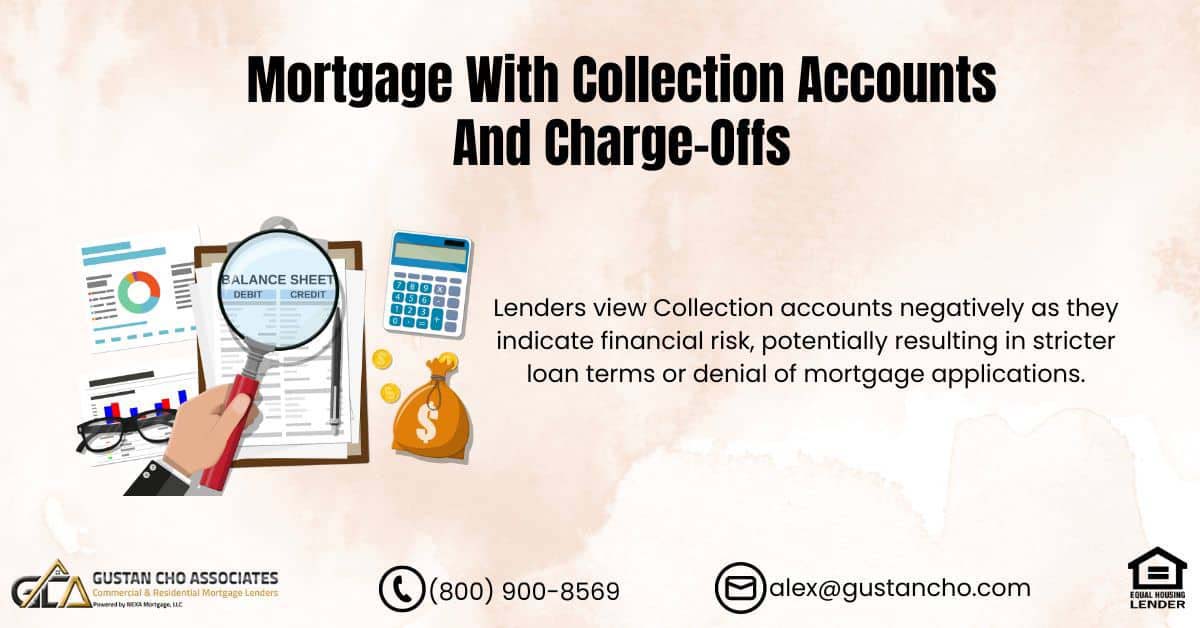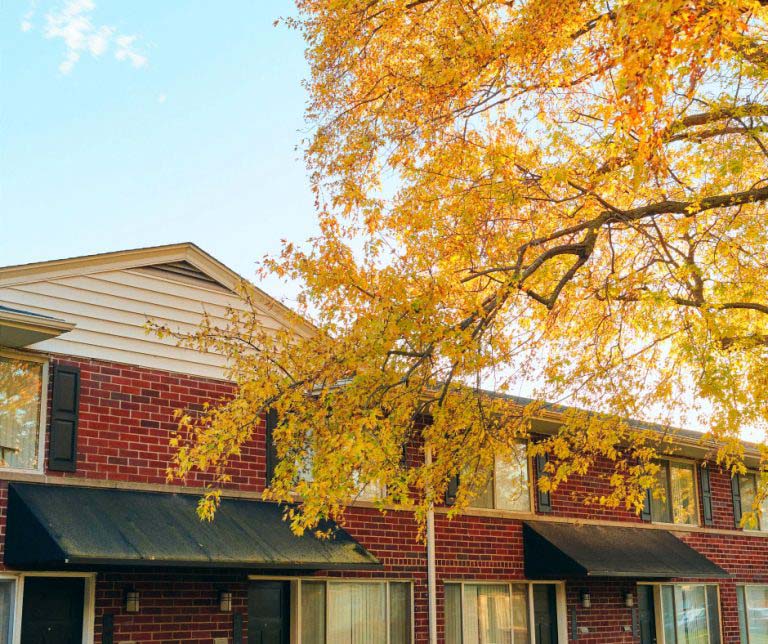In 2024, is it possible to secure a mortgage with collection accounts? Yes, find out how it can be done!
If you’re wondering whether getting a mortgage with collection accounts on your credit report is possible, you’re not alone. Many homebuyers find themselves in this situation, unsure whether their credit issues will stop them from achieving homeownership. The good news? You can qualify for a mortgage with collection accounts—you just need to know the right steps.
In this blog, we’ll break down the ins and outs of getting a mortgage with collection accounts or charge-offs. We’ll also provide key 2024 updates to help you navigate the mortgage process with confidence, even if you’ve had financial setbacks in the past.
Click here to apply for a mortgage loan if you have a charge-off
What Is a Collection Account in Mortgage Terms?
Before diving into how to get a mortgage with collection accounts, let’s clarify what a collection account is.
A collection account is a past-due debt that a creditor has sent to a collection agency. This typically happens after you miss payments on a debt like a credit card, medical bill, or personal loan. When a creditor decides not to collect money directly from you, they either sell the debt to a collection agency or hire one to recover the payment.
When this happens, the collection account shows up on your credit report. While it can hurt your credit score, it doesn’t mean you’re automatically disqualified from getting a mortgage.
Can I Get a Mortgage With Collection Accounts?
Yes, you can! The FHA allows you to qualify for a mortgage even if you have collection accounts and charge-offs without paying them off first. This is a huge relief for many borrowers who assume that unpaid collections automatically mean they can’t buy a home.
Here’s the truth: HUD guidelines don’t require you to pay off collection accounts to qualify for an FHA loan.
While some lenders might tell you differently, they’re likely imposing their own stricter rules—called lender overlays. If a lender follows the minimum FHA guidelines, you can still get approved for a loan, even with overlays that may make approval more difficult.
What Are Lender Overlays?
Lender overlays are rules that some mortgage companies add on top of standard guidelines set by FHA, VA, or Fannie Mae and Freddie Mac. For example, while FHA doesn’t require paying off collection accounts, a lender with overlays might insist that you pay them before approving your mortgage.
The good news? Not every lender has overlays. At Gustan Cho Associates, we don’t have any lender overlays. This means we follow the official FHA guidelines, and you won’t need to worry about stricter rules keeping you from homeownership.
Qualify for mortgage loans with collection accounts
What Are Charge-Offs, and Can I Still Get a Mortgage With Them?
A charge-off happens when a creditor gives up on collecting your debt and marks it as a loss on their books. Even though they aren’t actively trying to get you to pay it back, you still owe the debt, which can be sold to a collection agency.
Like with collections, you don’t have to pay off charge-offs to qualify for an FHA loan. However, charge-offs can impact your credit score, so it’s important to address them, especially if they’re recent. The older the charge-off, the less it will affect your ability to get a mortgage.
How FHA Guidelines Treat Collection and Charge-Off Accounts in 2024
The Federal Housing Administration (FHA) guidelines on mortgages with collection accounts and charge-offs are clear. Here’s what you need to know for 2024:
- No Requirement to Pay Off Collections or Charge-Offs: FHA does not mandate that you settle collection accounts or charge-offs to be approved for a loan.
- Medical Collections Are Exempt: If your collection accounts are medical debts, they’re completely excluded from your debt-to-income (DTI) ratio calculations. This is a huge advantage if unpaid medical bills affect your credit.
- Non-Medical Collections: For non-medical collection accounts with balances over $2,000, FHA requires lenders to use 5% of the outstanding balance when calculating your DTI ratio. However, you don’t have to make any payments toward these accounts.
- Charge-Offs Are Not Factored Into DTI Calculations: Charge-offs are ignored when it comes to your debt-to-income ratio, so they won’t stop you from qualifying for a loan as long as the rest of your finances are in good shape.
How to Improve Your Chances of Getting a Mortgage With Collection Accounts
While you don’t need to pay off your collection accounts to qualify for a mortgage, improving your overall credit profile can still help you get better loan terms. Here’s what you can do to increase your chances of approval:
- Check Your Credit Report: Get a copy of your credit report from all three major credit bureaus—Experian, Equifax, and TransUnion. Review it for errors and dispute any incorrect information, especially regarding collections or charge-offs.
- Pay Off Small Debts Where Possible: Consider doing so if you have any small collection accounts you can afford to pay off. Although it’s not mandatory, settling smaller debts can enhance your credit score and bolster your mortgage application.
- Settle Larger Debts: You can negotiate a settlement with the creditor or collection agency if you have large outstanding collections. They might accept less than the full balance, and settling could positively affect your credit score.
- Work on Building Credit: Start by paying all current debts on time. On-time payments have a big impact on your credit score. Also, consider adding new positive accounts, like a secured credit card, to improve your credit profile.
- Shop Around for Lenders: All lenders are different. Some impose lender overlays that can make it hard to qualify for a mortgage with collection accounts. Work with lenders who follow FHA’s basic guidelines and don’t add extra restrictions.
Medical Collections vs. Non-Medical Collections: What’s the Difference?

- Medical Collections: These are completely excluded from your debt-to-income ratio. FHA doesn’t count medical bills against you because they’re seen as unexpected expenses that can happen to anyone.
- Non-Medical Collections: If your total balance on non-medical collections is over $2,000, FHA guidelines require lenders to use 5% of that balance when calculating your DTI. For example, if you owe $5,000 in non-medical collections, the lender will count $250 per month (5% of $5,000) toward your monthly debts.
What If You Have a High Balance of Collection Accounts?
If you have a large amount of unpaid collections, don’t panic. Even if your debt-to-income ratio becomes too high because of the 5% rule, there’s a workaround.
You can set up a payment plan with the creditor or collection agency for a lower monthly payment. The amount you agree to in writing will be used to calculate your DTI instead of the 5%. You don’t need to have made any payments before closing—just having the payment agreement in place is enough.
What If a Lender Says You Can’t Get a Mortgage With Collection Accounts?
Don’t give up if you’ve been told that you can’t qualify for a mortgage because of unpaid collections or charge-offs! As we mentioned earlier, some lenders have overlays that make it harder to get approved.
The solution? Find a lender with no overlays. Many lenders, like Gustan Cho Associates, follow FHA’s guidelines without adding extra rules, making it possible to qualify even if you have collections or charge-offs.
Should You Pay Off Collection Accounts Before Applying for a Mortgage?
While it’s not required to pay off your collection accounts or charge-offs to qualify for an FHA loan, there are situations where it might make sense:
- Improving Your Credit Score: Paying off collections can boost your credit score, especially if the accounts are newer. However, make sure you negotiate for the collection to be removed from your credit report in exchange for payment. This can give your score an even bigger boost.
- Securing Better Loan Terms: Remember this information: The better your credit score is, the more favorable your mortgage terms will be. Paying off collections and seeing a substantial increase in your credit score could make you qualify for a lower interest rate. Throughout the loan term, this can save you thousands of dollars.
- Avoiding Debt-to-Income Issues: If you’re close to exceeding FHA’s DTI limits because of large unpaid collection balances, setting up a payment plan or paying off some of the debt might help keep you within the acceptable range.
What Happens When Your Credit Score Changes During the Mortgage Process?
Keep your credit in good shape while getting approved for a mortgage. Lenders will check your credit again before finalizing the deal. If your credit score drops significantly or you take on more debt, it could affect your approval or loan terms.
Here’s how to avoid any issues:
- Don’t open new credit accounts.
- Don’t miss any payments.
- Avoid large purchases on credit.
By keeping your finances steady, you’ll be in the best position to get approved for your mortgage.
Apply for Mortgage Loans with Lender Overlay with Collection Accounts
2024 FHA Guidelines: Mortgage With Collection Accounts
The FHA’s 2024 guidelines offer some of the most flexible terms for borrowers with credit challenges like collection accounts and charge-offs. Key highlights include:
- Minimum Credit Score: To be eligible for a 3.5% down payment FHA loan, you must have a credit score of 580 or above.
- No Requirement to Pay Collections: You don’t have to pay off collections or charge-offs to qualify.
- Flexible DTI Ratios: FHA allows debt-to-income ratios up to 43% for borrowers with credit scores below 620 and up to 56.9% for those above 620.
- Medical Collections Don’t Count: Medical collection accounts are completely excluded from DTI calculations.
- Payment Plans for High Balances: Instead of the standard 5% rule, you can use a payment agreement with creditors to lower your DTI calculation.
Ready to Get Started? Apply for a Mortgage Today
At Gustan Cho Associates, we specialize in helping borrowers with collection accounts, charge-offs, and other credit challenges get approved for a mortgage. We don’t impose lender overlays so that you can qualify based on FHA’s guidelines.
Don’t let your credit history stop you from buying a home. Contact us today at 800-900-8569 or email us at alex@gustancho.com to see how we can help you secure the home of your dreams, even with collection accounts on your credit report.
Frequently Asked Questions About Mortgage With Collection Accounts:
Q: Can I Get a Mortgage with Collection Accounts in 2024?
A: Yes! In 2024, FHA guidelines allow borrowers to qualify for a mortgage with collection accounts without paying them off first.
Q: Do I Need to Pay Off Collection Accounts to Get an FHA Loan?
A: No, FHA does not require you to pay off collection accounts to qualify for a mortgage, though some lenders may have stricter requirements.
Q: What is a Collection Account in a Mortgage?
A: A collection account is a debt handed over to a collection agency due to missed payments. It appears on your credit report but does not automatically disqualify you from getting a mortgage with collection accounts.
Q: How do Charge-Offs Affect My Ability to Get a Mortgage?
A: Charge-offs can impact your credit score, but you don’t have to pay them off to qualify for a mortgage. FHA guidelines allow you to get a loan even with charge-offs.
Q: What’s the Difference Between Medical and Non-Medical Collection Accounts?
A: Medical collections are excluded from your debt-to-income (DTI) ratio. In contrast, non-medical collections over $2,000 may count 5% of the balance toward your DTI calculation when applying for a mortgage with collection accounts.
Q: What Should I Do if a Lender Says I Need to Pay Off My Collections?
A: They may have overlays if a lender insists you must pay off collection accounts to qualify for a mortgage. Consider finding a lender without these extra requirements.
Q: Can Setting Up a Payment Plan Help if I Have Large Collection Account Balances?
A: Yes, setting up a written payment agreement with a collection agency can help reduce the impact of large collection balances on your DTI ratio, which can help you qualify for a mortgage with collection accounts.
Q: How Can I Improve My Chances of Getting a Mortgage With Collection Accounts?
A: Check your credit report, settle smaller debts, and work on improving your credit score by making on-time payments. These actions can boost your chances of getting approved for a mortgage.
Q: Will My Credit Score Affect My Mortgage Approval Even With Collection Accounts?
A: A high credit score can enhance your likelihood of securing a mortgage. It could lead to more favorable loan conditions, even with collection accounts.
Q: What Should I Avoid During the Mortgage Process to Ensure Approval?
A: Avoid opening new credit accounts, making large purchases, or missing payments while applying for a mortgage. Keeping your credit stable will help ensure your approval, even with collection accounts.
This blog about “Mortgage With Collection Accounts And Charge-Offs” was updated on September 27th, 2024.









